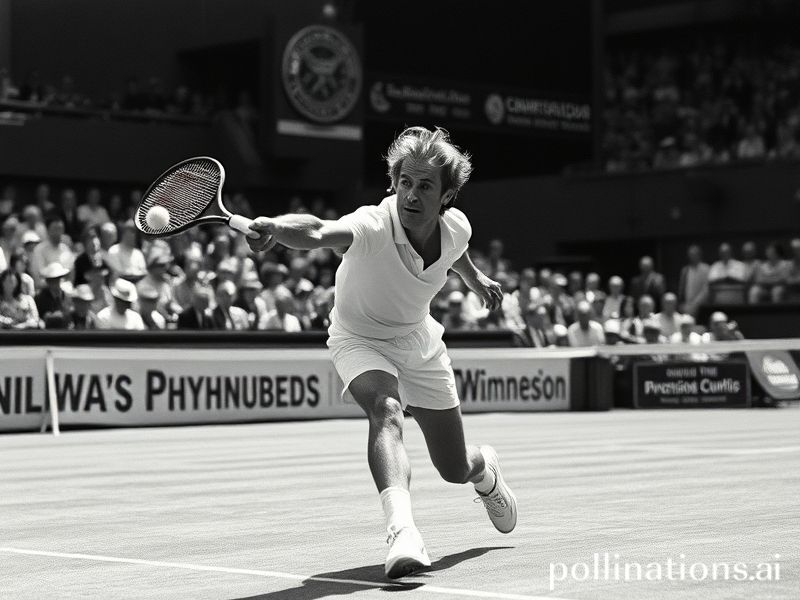Rod Laver: The Aussie Time Machine Who Makes the Modern World Feel Amateur
Rod Laver: The Last Man Who Made the World Shut Up and Watch
By L. V. Carver, International Correspondent, Dave’s Locker
In an age when a TikTok of a cat sneezing can eclipse a cease-fire negotiation, it takes a special kind of fossil to remind us that once—brace yourself—skill mattered. Enter Rodney George Laver, the 5-foot-8 redhead from Queensland who, between 1962 and 1969, won not one but two calendar-year Grand Slams, a feat so statistically improbable that Vegas oddsmakers now refuse to quote it for fear the house will spontaneously combust.
Globally, Laver’s timing was exquisite. He debuted his first Slam sweep the same year the Cuban Missile Crisis had humanity practicing duck-and-cover drills under school desks—an optimistic maneuver roughly as effective as my 401(k). While diplomats stockpiled canned beans, Laver was stockpiling majors on grass, clay and whatever passed for hardcourt in those sepia days, inadvertently proving that mutually assured destruction is slightly less riveting than a left-handed topspin lob.
International reverence followed, though never quite in proportion. The French called him “Le Rocket” with the same straight face they use for calling McDonald’s “McDo.” In the United States, where any foreigner who wins too much is promptly investigated for communism or gluten, Laver was tolerated because he looked like a tax accountant and smiled like he’d come to audit your soul. Meanwhile, in the Soviet Union, Pravda dismissed tennis as bourgeois frippery—right up until satellite photos revealed Laver’s backhand was more accurate than anything in their missile program, at which point the Politburo quietly ordered five thousand aluminum racquets and a crate of kangaroos for reverse-engineering.
The broader significance? Laver predated the modern trifecta of branding, branding and more branding. No shoe contracts, no crypto endorsements, no on-court patches advertising a Japanese toilet that sings Sinatra. His only visible sponsor was a tiny Dunlop logo, roughly the size of the moral compass we misplace every election cycle. Today, when an athlete’s Instagram following is weighed against their vertical leap, Laver’s 200 total titles look like cuneiform tablets: impressive, but who has the bandwidth?
Yet the world still leans in when Laver shuffles into Melbourne Park each January, a living reminder that greatness once came without a blue checkmark. Broadcasters in 196 countries cut to him during rain delays, hoping a half-second smile will spike ratings faster than another dissection of Hawkeye replays. Sponsors queue politely, eager to bottle whatever preservative keeps him ambulatory at 85, presumably the same one used on Keith Richards.
And here’s the gallows humor: Laver’s era was objectively worse—wooden racquets, international flights that doubled as tuberculosis incubators, prize money that barely covered motel detergent. Still, the man won everything, twice, while the rest of us can’t manage a dentist appointment without a Google Calendar alert. If that doesn’t sting, you’re probably already dead inside or running for Congress.
In the macro sense, Laver is a geopolitical pacifier. When trade wars flare and supply chains snap like cheap polyester, diplomats at Wimbledon still manage a cease-fire over strawberries and the shared acknowledgment that nobody, not even the algorithm, will ever duplicate 1969. The Laver Cup—an exhibition series Europe pretends isn’t just Ryder Cup cosplay—now pits continents against each other in a gentlemanly blood sport, proving globalization is fine as long as there’s champagne at courtside.
Conclusion? Rod Laver remains the rare human artifact that every nation claims a sliver of, like the moon landing or the recipe for Coca-Cola. He’s Australia’s sunburned gift to a planet perpetually on fire, the quiet assurance that excellence can still be quiet. And while we doom-scroll toward the next catastrophe, it’s oddly comforting to know that somewhere, a lefty with a 4½-inch grip once made the whole miserable world stop for five sets and breathe.







